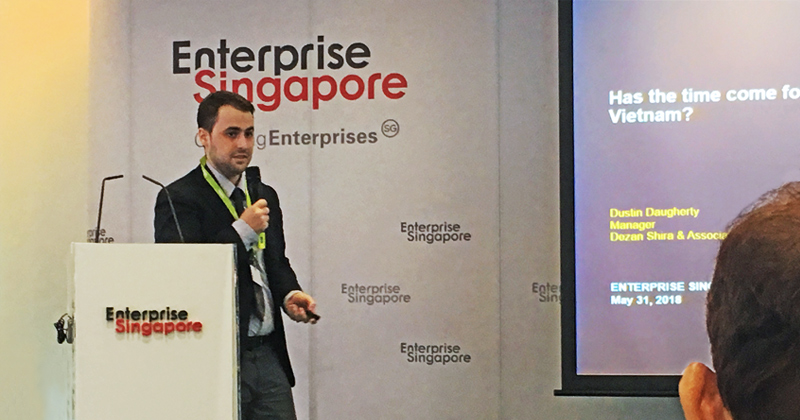With its rising standard of living and proactive economic development, Vietnam is poised to be the region’s up-and-coming economy. With more Singaporean business owners eager to learn about opportunities in this market of close to 100 million, we recently organised an iAdvisory session focused on business opportunities in the country.
Road to reform

Ever since Vietnam implemented its Doi Moi reforms in the 1980s, it has made consistent efforts in liberalising its economy, and it is expected to sustain economic growth over 5% until the 2030s. The state has been making efforts in privatising many previously state-owned enterprises, and private enterprises are now flourishing in the Vietnamese economy.
2017 was the year that saw highest foreign domestic investment since 2007, with manufacturing attracting most of the capital. This is related to the large scale importing of technology from countries such as South Korea and Japan, who are taking advantage of Vietnam’s low labour cost at the moment, where the minimum wage is the equivalent of US$175 a month in Hanoi.
Dustin Daugherty, Manager at Dezan Shira & Associates, cites ICT as a “hot sector” right now. Indeed, the low overheads and abundance of talent make Vietnam an attractive destination for outsource service hubs.
Vietnam’ economy at a glance
Vietnam is divided into three Key Economic Regions (KER) – North, South and Central, each with its own unique characteristics.
The North, being close to China, makes it ideal for the China +1 model, where a company can base part of its operations outside China where costs are relatively cheaper. It is currently home to Hon Hai Precision and Nihon Denkei.
The South is the dominant commercial base of the country, and attracts international players such as Samsung and LG, as well as SMEs and traders.
While the Central is not as developed as the North or the South, more companies are now looking at the area to capture first mover advantages due to lesser competition especially in sectors like tourism and IT.
Trade prospects
Mr Daugherty highlights that Vietnam has been “remarkably far sighted and aggressive” in joining trade agreements. Vietnam, alongside ASEAN countries such as Singapore, Malaysia and Brunei Darussalam are signatories to the concluded Comprehensive and Progressive Agreement for Trans-Pacific Partnership (CPTPP).
It is in the CPTPP that Vietnam is most strategically positioned. Large IT investors from South Korea and Japan such as Samsung will seek input goods, which come from other members of the CPTPP. Vietnam can thus position itself as the assembly point, and ship out the finished products.
Tricia Tay, Development Partner at Enterprise Singapore, adds that Singapore-based businesses can enjoy preferential treatment for products under the ASEAN FTA, as long as the Rules of Origin criteria are satisfied. Companies which have a Preferential Certificate of Origin can also enjoy certain arrangements allowed under the ASEAN FTA. For example, concession duties can be enjoyed for a model where goods from Vietnam are imported into a Regional Distribution Centre in Singapore for onwards distribution to consumers in other ASEAN countries. To find out more about FTAs and tariffs, Companies can use the Tariff Finder - a complimentary service for Singapore-based companies.

However, investors still need to be wary of a few challenges. The supply chain and infrastructure still has significant room for improvement, but on the flip side, this also presents opportunities for foreign companies to develop it. The language barrier is another potential issue, although this can be mitigated by hiring translators. In addition, wages are rising rapidly, as evident by the National Wage Council’s decision on 7.3% increase in monthly minimum wages in 20171. This means now is the time to enter the market if firms still want to reap the benefits of competitive wages.
“Towkays must head out!”
Another speaker present at the iAdvisory was Toby Koh, Group Managing Director of Ademco Security Group. The group focuses on the upper middle and high-end integration of securities, which helped them expand to over 20 offices in 7 countries around Asia.
He cites perseverance as the key to international success. This was a trait especially relevant for Vietnam, where he faced numerous challenges. The language barrier meant that he couldn’t speak to more than half of his Vietnamese employees, while the lack of familiarity with certain business processes proved difficult at times. Still, there were solutions – such as hiring translators and spending more time installing corporate practices. Today, he’s confident Vietnam still promises substantive opportunities, as evident by the firm’s maiden acquisition in the country back in February this year.

